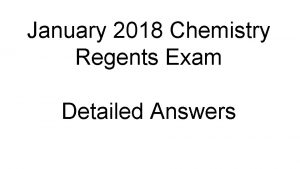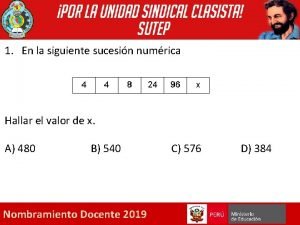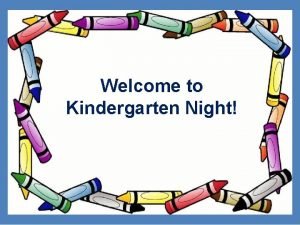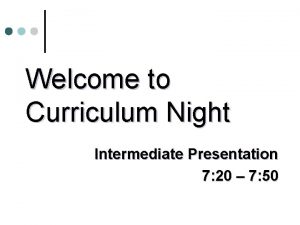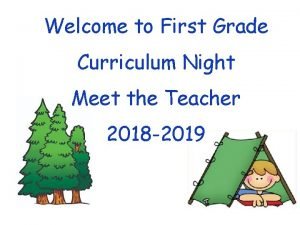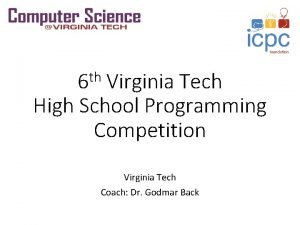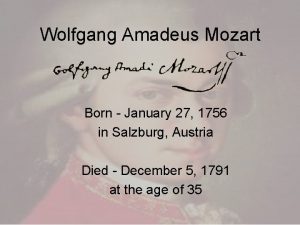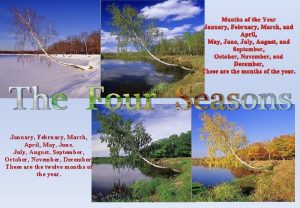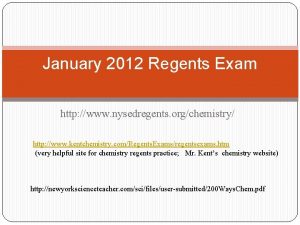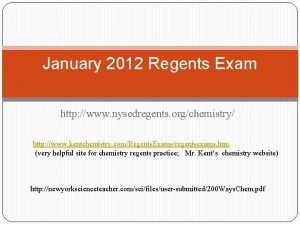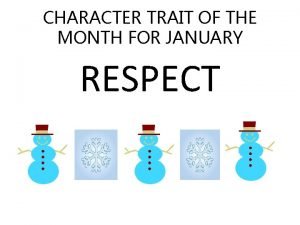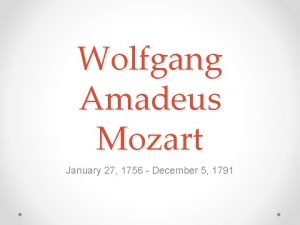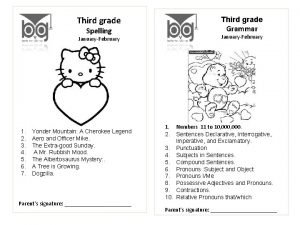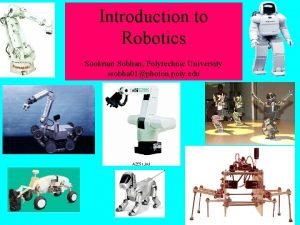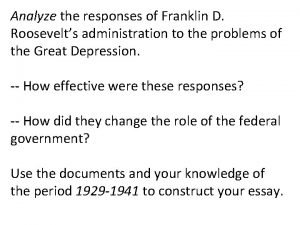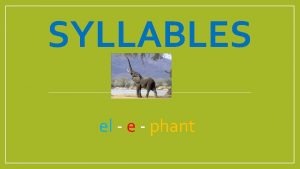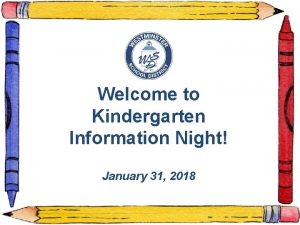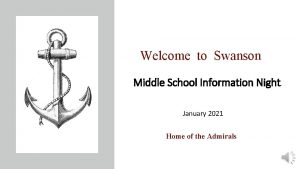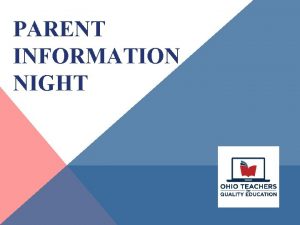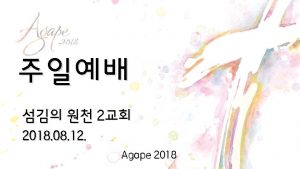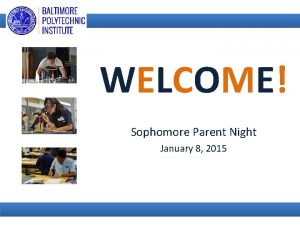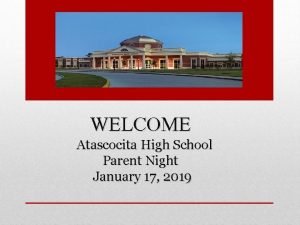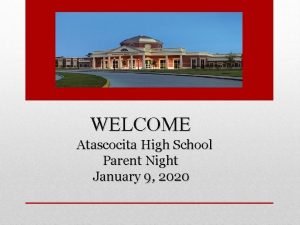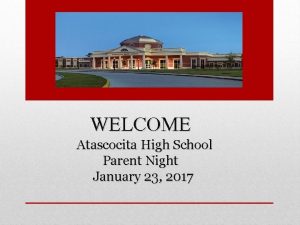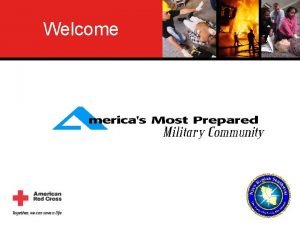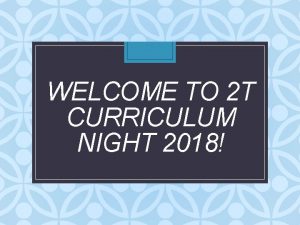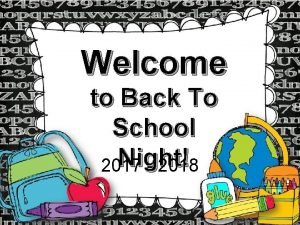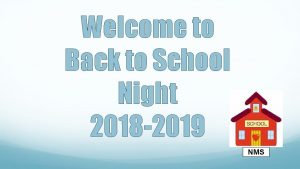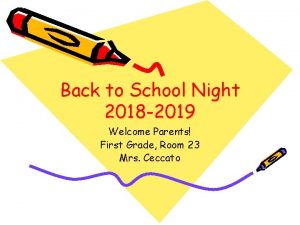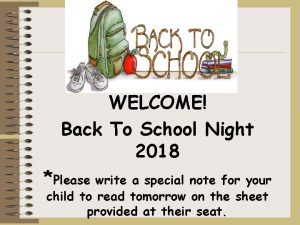WELCOME COMMUNITY SCHOOL INFORMATION NIGHT JANUARY 2018 COMMUNITY


































- Slides: 34

WELCOME! COMMUNITY SCHOOL INFORMATION NIGHT JANUARY 2018

COMMUNITY SCHOOL STAFF Teaching Staff Jill Reifschneider- 1 st & 2 nd grade Marilyn Fullerton - 2 nd & 3 rd grade Johanna Aleksis- 4 th & 5 th grade Kerry Yuasa – Instructional Assistant Office Manager Michele Aiken-Dunn Principal Margaret Kinney

Challenge children academically, physically, creatively, socially & emotionally in an atmosphere of cooperation and trust. Students Teachers Parents

Community School Construct 1: Children Learn by Doing This applies to: • Making decisions We do this by consensus (no voting). • Taking responsibility We provide opportunities to gain responsibility through student goal-setting and self-reflections, group work, all-school events, and multi-aged interactions. • Engaging in critical thinking We encourage this with inquiry-based academics. • Solving problems (intellectual and interpersonal) We teach appreciation for different points of view.

Community School Construct 2: Children learn best when their abilities are challenged, internal motivation is increased, and their interest and learning style is taken into account. Students are expected to put forth their best efforts to achieve their potential (socially, emotionally, and academically).

Community School Construct 3: The community supports the teachers in their professional judgment as to the best strategies to meet the needs of each individual child as well as the whole class. Curriculum planning and implementation is the Teachers’ Domain. This includes, but is not limited to: class configurations, designing mixed-age partnerships and peer working groups, camp cabin assignments, field trip chaperone assignments, student discipline, and classroom management.

Community School Construct 4: Children learn best in a supportive, cooperative environment.

Community School’s supportive and cooperative learning environment is paramount to our students’ success. This vital standard is upheld by diligently choosing non-competitive means of assessment, play, and academic learning. no tests. . . no report cards. . . no comparisons. . . no winners or losers. . . Mutual trust and strong relationships with teachers and peers fosters confidence and a sense of responsibility in our students.

CONFERENCES/PORTFOLIOS • Conferences are held early in the year for goalsetting and mid-year to discuss evidence of progress. • Students choose work for their portfolios to show their growth over time. • During validation conferences, students share and explain their “works of pride” to their parents.

Community School Construct 5: Children learn best in an atmosphere where their process, and not merely the end result, is acknowledged, and mistakes are recognized as a natural part of the learning process.

Community School Construct 6: Opportunities for interaction between students of all ages lead to integration of learning, increased ability in social skills, problem-solving skills and decision-making skills.

MULTI-AGE LEARNING OPPORTUNITIES Reading Pals: An older student is paired with a younger student to read together once per week through the year. Breaks: All of our students eat lunch and take breaks together at the same time. Triads: Two to three children from different classes team up to complete projects and take field trips. Little Brothers/Little Sisters: An older student is paired with a younger student to provide occasional learning support.

Community School Construct 7: Children learn best in an atmosphere that acknowledges and integrates their social, emotional, cognitive and physical development. We take time for: playing together, sharing stories, imparting knowledge, discussing issues and resolving conflicts.

Community School Construct 8: Children learn best when they feel good about themselves, and feel empowered socially, emotionally and academically. Community School students are not judged, graded, tested, or compared to each other.

Community School Construct 9: Children learn more readily when their home environment is philosophically compatible with the educational framework of their learning. Parents/guardians choose, value and support the studentcentered learning that children embark upon daily, even though it may be different from the way that parents/guardians were taught.

Community School Construct 10: Children learn best when parents work cooperatively with teachers and are actively and visibly involved in their child’s social and academic development.

PARENTS PLAY AN IMPORTANT ROLE AT COMMUNITY SCHOOL: • working cooperatively with teachers • providing enriching experiences • promoting the love of learning

REQUIRED VOLUNTEER HOURS DURING THE SCHOOL DAY • Help supervise students on playground before school, during morning break time or at the lunch hour (at least 13 hours each family annually). • Chaperone a field trip (at least one each family) • Additional opportunities: v Help in the classroom upon teacher request v Parties v Lead Choice activities v Read-A-Thon v Art

REQUIRED VOLUNTEER HOURS OUTSIDE OF THE SCHOOL DAY • Committee Work: Steering, Enrollment, Finance, New Parent Orientation, Fundraising, Social Events, etc. • Work Parties • Maintain Garden • Correct Spelling Assignments • Building and Site Improvements • Classroom Material Prep

Community School Construct 11: Children learn best when their horizons are broadened by exposure to the interests and styles of many people, including other children, teachers, parents and the community-at-large. Field trips, parents and community volunteers, camps, and Parent Choice.

Children who prosper at Community School: • Enjoy interacting with children of all ages • Set goals for their growth • Work toward personal responsibility • Thrive without competition or external rewards • Show pride in their work due to their efforts and internal motivation, not due to external validation or rewards • No hurting on the inside or outside

IMPORTANT CONSIDERATIONS

TRANSPORTATION CONSIDERATIONS Parents need to provide transportation to and from school. No busing is provided by the Lake Washington School District. We encourage carpools.

SCHOOL HOURS 8: 30 A. M. – 3: 20 P. M. Drop off after 8: 00 a. m. Pick up at 3: 20 p. m. or Wednesdays when dismissal is at 11: 40 a. m. There is no supervision prior to 8: 00 a. m. or after we dismiss at 3: 20 p. m. or 11: 40 The Community School staff is not legally responsible for your children prior to 8: 00 a. m. or after 3: 20 p. m.

CONSIDERATIONS RELATED TO OUR MULTI-AGE CLASSROOMS Our program is 1 st through 5 th grade. A full five-year commitment is expected. Lake Washington School District curricula are taught in our multi-age classrooms. • Science and Social Studies: LWSD curricula are taught on a rotational basis, so all students are exposed to all the subject matter over the course of their five-year-long attendance at C. S. • Mathematics, Reading, Writing: Common Core State Standards are incorporated into our multi-year academic planning.

OTHER IMPORTANT CONSIDERATIONS Any pull-out program, or activity requiring regular absence from Community School, will mean that your child will miss important aspects of the CS program. This is especially challenging for our learners and families. Examples: • Pull-out Quest • Regular Professional Appointments • Athletics, or Other Hobbies

STUDENT SELF ASSESSMENT Community School students take an active role in identifying their strengths and challenges, and setting personal goals. Portfolios and Conferences • Parents’ goals for their child are considered during the Fall goal-setting process. • Student-led mid-year conferences are an opportunity for students to share works of pride. • Student portfolios demonstrate student learning for the year.

TEACHER ASSESSMENT TOOLS ASSESSMENT IS FOR THE PURPOSE OF PLANNING APPROPRIATE LEARNING EXPERIENCES • Student growth will be measured using: DIBELS (K-2 Reading) LWSD CDSAs for Math, Science, SS, and ELA en. Vision Math Assessments Teacher Observation Student Reflections Goal Setting

SUPPORT SYSTEM WHEN A CHILD NEEDS HELP • If a child’s teacher is concerned about any area of a child’s development (academic, social, emotional, physical), the teacher will arrange a meeting with parents to discuss the concern. • The school’s guidance team will be consulted when a teacher seeks advice, or strategies, to address concerns related to a child’s lack of progress over time, despite instructional accommodations.

FAMILY COMMITMENT This year we anticipate that it will take $230 per child (plus fees for camps)* to cover expenses that are outside the District budget. *scholarships available Volunteer three hours per week in three ways: 1. During the school day 2. The monthly parent meeting 3. Outside of the school day

MONTHLY PARENT MEETING This is your opportunity to become informed and involved in decision making. Hear teacher announcements and updates. Volunteer to help with ongoing events. *Attendance is mandatory and is an integral part of the Community School culture.

Parents at Community School: • Participate actively and visibly • Promote cooperation & non-competitiveness • Attend monthly parent meetings • Support staff, students, and each other.

SPECIAL EDUCATION CONSIDERATIONS • The student’s IEP team determines the services and placement. Legally, students must receive services as specified on the IEP. • When the level of services and/or the placement in a specific district program is not offered at the Choice school, the student’s placement will remain at the specific district program, or the student may receive the special education services at an alternate school site location in our district.

IMPORTANT NEXT STEPS… January 19 th, 2018 Online Application DUE by 4: 00 pm. February 1 st, 2018: Choice School Lottery takes place February 7 th, 2018: Notification e-mail sent to parents. February 7 th, 2018: Parent Tour 10: 30 -12: 00 pm (RSVP please) February 21 nd, 2018: Acceptance deadline. All applicants must notify Community School main office of acceptance no later than 2: 30 p. m.
 January 2016 chemistry regents answers
January 2016 chemistry regents answers 1st january 2018
1st january 2018 Dada la siguiente secuencia rusia 2018 rusia 2018
Dada la siguiente secuencia rusia 2018 rusia 2018 Wise men three clever are we
Wise men three clever are we Welcome to kindergarten night
Welcome to kindergarten night Welcome to curriculum night
Welcome to curriculum night Welcome to curriculum night
Welcome to curriculum night Symbols in night by elie wiesel
Symbols in night by elie wiesel Silent night holy night all is calm
Silent night holy night all is calm 2018 virginia tech high school programming contest
2018 virginia tech high school programming contest Was born in salzburg austria on january 27 1756
Was born in salzburg austria on january 27 1756 Zodiac for january 20
Zodiac for january 20 Newton biography
Newton biography January february march season
January february march season January february march
January february march Kent chemistry reference table
Kent chemistry reference table January 2012 chemistry regents
January 2012 chemistry regents January starts the year poem risa jordan
January starts the year poem risa jordan 2019 ib grade boundaries
2019 ib grade boundaries Respect is a trait
Respect is a trait April 2006 calendar
April 2006 calendar January 27 1756
January 27 1756 Mozart's grave
Mozart's grave January february spelling
January february spelling What is the theme for the month of january
What is the theme for the month of january Our sun life cycle
Our sun life cycle January 24 1848
January 24 1848 Meridel lesueur, new masses, january 1932.
Meridel lesueur, new masses, january 1932. Polytechnic hardware store
Polytechnic hardware store 25 january 1759
25 january 1759 An asset was purchased for $120 000 on january 1
An asset was purchased for $120 000 on january 1 Letter to senator robert wagner
Letter to senator robert wagner January how many syllables
January how many syllables Tinseltow
Tinseltow Blackberry devices working on january
Blackberry devices working on january
